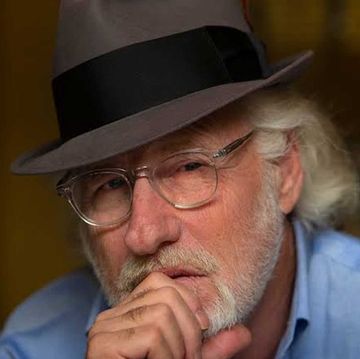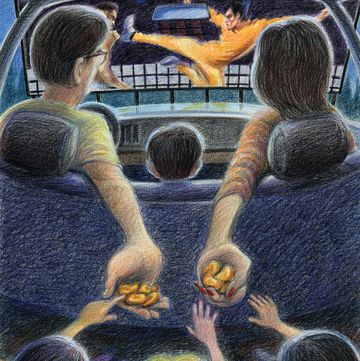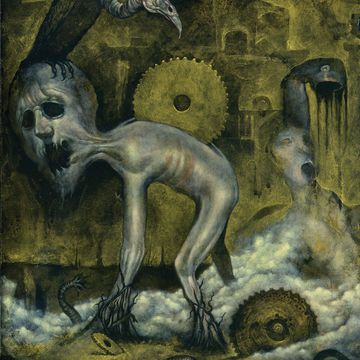Welcome to the workshop! To help you integrate smoothly into this collaborative monthly writing group, we’ve put together a few scenarios for you to ponder. We aim to ensure that the give-and-take of literary collaboration is constructive for both our submitting writers and those who critique their work. Remember: There are no wrong answers, only alternate narrative choices!
This article appears in Issue 25 of Alta Journal.
SUBSCRIBE
1. Someone in the group has described another’s main character as “vapid, self-absorbed, sexually repulsive, and generally intolerable.” The writer replies that, deep down, she imagined that particular character as a more heroic version of herself. The critic should:
A. Fake his own death and move to another state to avoid encountering the writer ever again.
B. Double down, adding that the character “feels like Frankenstein’s monster but assembled using only human faults.”
C. Backpedal and applaud as “borderline brilliant” the writer’s decision to make the character “so transparently self-delusional.”
D. Offer to hook the writer up with a good therapist.
2. A workshop member has submitted an excruciatingly graphic sex scene in which he reveals his most disturbing personal kink. Eye contact ceases, and the writer suddenly realizes no one in the group will ever look at him the same way again. The writer should:
A. Laugh it off and say, “I’m just trying to make sure this entirely fictional character comes off as utterly depraved.”
B. Offer a knowing nod, followed by an expression of kinship with Anaïs Nin and Henry Miller.
C. Vigorously argue his constitutional right to free expression under the First Amendment.
D. Simply ask, “So, too much, then?”
3. In a common phenomenon known as research rapture, a writer’s passing reference to her main character’s difficult childhood in Lithuania is followed by a 14-page info-dump of facts about that Baltic state—including population figures, major industries, leading agricultural exports, and GDP—clearly cut-and-pasted from Wikipedia. Workshop partners should:
A. Mourn the absence of characters and plot during the misguided narrative detour.
B. Suggest splitting the book into two books—one a novel built around the themes of childhood trauma, displacement, and cultural alienation in northern Europe, the other a middle-grade geography textbook.
C. Suggest cutting the entire section in favor of a dense and deeply buried endnote for those readers who just can’t get enough information about Lithuania.
D. Propose that the writer refocus on character and story because “honestly, nobody gives a rat’s ass about Lithuania.”
4. A workshop partner’s unpunctuated “experiential and experimental” poem lamenting the world’s downward spiral into hopelessness and despair is, unfortunately, complete gibberish. Despite the author’s passionate and heartfelt reading, including an attempt to mimic “the sonorous voice of an uncaring God,” the work is met with puzzled looks all around. One group member feigns a cough and excuses herself to the hallway to disguise her laughter. The writer should:
A. Defiantly justify the incomprehensibility of the work by arguing that her fellow workshop members “clearly aren’t capable of understanding it.”
B. Reference the long tradition of impenetrable stream-of-consciousness writing as evidence of the work’s genius.
C. Smugly declare her recent liberation from the “shackles of iambic pentameter” and hope that no one will ask her to explain exactly what that means.
D. Thank her fellow writers for their feedback, then later cite that feedback as proof of the world’s downward spiral into hopelessness and despair.
5. A memoirist has described her uterus as “a great inland sea” and suggested that there is much to be learned about the human condition from her sharing in precise detail the environmental conditions deep inside her body. An unsubtle critic has asked why readers should care about her uterus, even if it has many meaningful things to say, and the two are now glaring across the table at each other. The workshop leader should:
A. Suggest a break, then quietly retreat to his car and drive away.
B. Joke that “similarly, my colon won’t shut up.”
C. Ask other workshop members to describe their top-of-mind thoughts about the writer’s uterus.
D. Close his eyes, insert his AirPods, and crank up whatever music will drive the distracting image of a chatty uterus from his head.
6. Nothing much happens in the opening chapter of a writer’s proposed suspense novel. Or the second chapter. Or the third. Instead, the writer spends the first 80 pages introducing readers to the hero and the hero’s family and explaining the hero’s entire backstory in encyclopedic detail. Workshop partners should:
A. Scribble a dramatic series of “Zzzzs” across each of those pages.
B. Explain that creating suspense is about the artful dispensation and withholding of information rather than the blurted revelation of it.
C. Remind the writer to “show, don’t tell,” regardless of the maxim’s relevance, because that advice can remedy about half of the problems in any given manuscript.
D. Ask, “And when might something actually happen?”
7. A workshop partner dismisses a fellow writer’s absorbing story about a racial standoff in Mozambique as “invalid” because the writer is not a Mozambican, is oblivious to his own privilege, and simply can’t “fully appreciate the lived experience” of people so different from himself. The writer should:
A. Dissolve into a puddle of shame and regret and apologize to the group for attempting to write about something outside of his own life experience.
B. Offer to produce proof that there’s at least one native of Mozambique somewhere in his family tree.
C. Ask how Donna Tartt could have won the 2014 Pulitzer Prize in Fiction though she had never been a 13-year-old boy, a survivor of a terrorist attack, an art thief, or a counterfeit-antiques dealer.
D. Rewrite the entire story into a thinly disguised apology for European colonialism that acknowledges his “blinkered white-male gaze.”
8. A romance writer’s manuscript is filled with terrible and tortured body-part metaphors, including references to a male character’s “jousting lance of manhood” and a female character’s “billowing, well-displayed she-pillows.” Critics should:
A. Request more of the same, hoping to steal a few ideas to submit to the annual Bulwer-Lytton Fiction Contest (founded at San José State University), which asks competing writers to compose the opening sentence to the worst of all possible novels.
B. Ask the writer for a dramatic reading, hoping she’ll recognize absurdity once she hears it read aloud.
C. Remind the writer that romance readers crave emotion and human connection, not just engorged thises and heaving thats.
D. Commend the writer’s sly decision to acknowledge the genre’s overused tropes while at the same time parodying them.
9. Rather than listen to feedback from his workshop partners, a submitting writer dismisses each critic’s concerns because “any reasonable reader would understand what I mean.” Fellow workshop members should:
A. Designate one attendee to leave early and key the door panels of the writer’s Tesla.
B. Suggest that the writer find a more adoring group of beta readers, such as his doting mom or a besotted lover who considers him a tragically undiscovered “voice of our generation.”
C. Praise the writer for pointing out everyone’s stupidity and vow to be more insightful in the future.
D. Thank the writer for wasting everyone’s time.•
Martin Smith is the author of five novels and five nonfiction books, including Going to Trinidad: A Doctor, a Colorado Town, and Stories from an Unlikely Gender Crossroads, which was released this spring.













